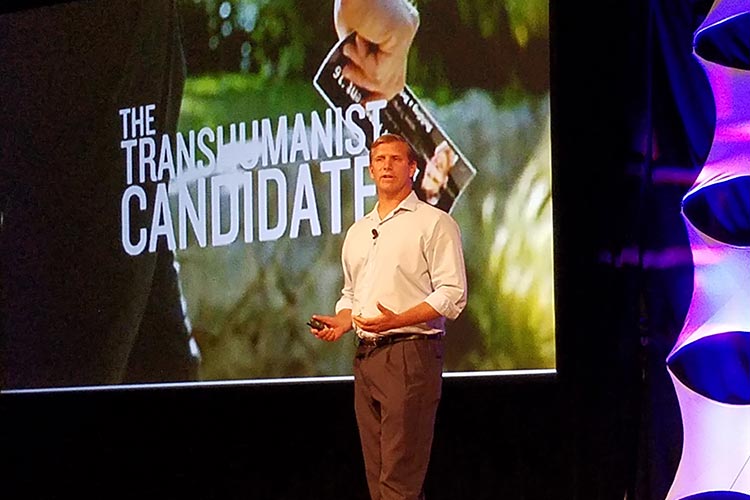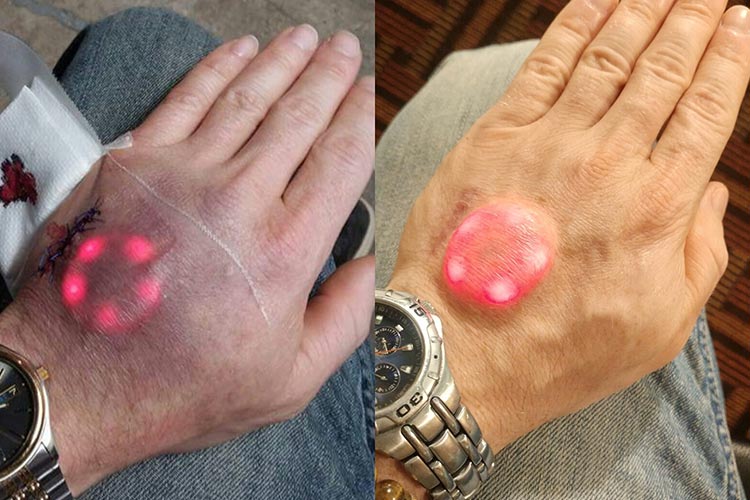Can bionic limbs and implanted technology make you faster and stronger? Meet biohackers working on the frontier.
Zoltan Istvan has achieved every runner’s fantasy: the ability to run without the hassle of carrying his keys. Thanks to a tiny chip implanted in his hand, Istvan doesn’t have to tie a key onto his laces, tuck it under a rock in the front yard, or find shorts with little zipper pockets built in. Just a wave of the microchip implanted in his hand will unlock the door of his home. The chip doesn’t yet negate the need for a Fitbit, a phone, or a pair of earbuds on long runs, but Istvan says it’s only a matter of time.
A long-time athlete and technology geek, Istvan identifies as a transhumanist: he believes that the transformation of the human body through ever-developing and evolving technologies will improve human life and ultimately lead to immortality.
“Athletes should be able to use drugs and technologies to enable them to be more competitive. To restrict that is to go against the very best of what we can become. If somebody wants to take these risks, they should have the rights to do so in full.”
“We have these technologies that literally could change the face of humanity here very soon,” Istvan says. “In a decade’s time, we’ll have intelligence at least as smart as humans, probably smarter.”
For now, Istvan’s implant doesn’t do much for him as an athlete, aside from eliminating the need to carry a jangling set of keys when he’s running or surfing. But as the implant industry continues to develop, Istvan says it’s only a matter of time before people—especially athletes—are voluntarily replacing entire arms and legs with bionic limbs.
“In seven to 10 years bionic arms will simply be better than human arms,” Istvan says, predicting that football players, for example, may find themselves willing to sacrifice a biological arm in favor of a robotic alternative that can repeatedly throw a flawless 100-yard pass.
“I think athletes should be able to use drugs and technologies to enable them to be more competitive,” he says. “I know there are Olympic athletes who would do bad things to their bodies in order to achieve five minutes of fame, and sure there’s an ethical question, but to restrict that is to go against the very best of what we can become. If somebody wants to take these risks, they should have the rights to do so in full.”
Would it be fair for athletes with biomedical enhancements (like swimmers with webbed feet, or marathon runners with bionic legs) to go up against competitors who haven’t altered their bodies? Absolutely not, Istvan says. “That’s why I think an entire new sporting environment should be created to harness those ambitions,” he says, touting a concept from his political platform: the Transhumanist Olympics. “It would be really interesting to have people wear an Ironman suit and box it out. Who wouldn’t want to watch that? I think people would say wow, this is the next level of human evolution.”

Pandora’s box of prosthetics
Gary Hearn, a long-time ultrarunner who lives in Farmville, Virginia, has what may be the original performance enhancement implant: a pacemaker. And that’s about as far as he’s willing to go on that front. But having competed in upwards of 40 races per year during his peak running years, he says there will always be athletes who want to push the envelope.
“I think it’ll be a Pandora’s box once you open it up, where anything goes,” he says. “I could see more along the lines of genetic engineering, trying to create superior individuals using selective breeding.”
Or perhaps using injectable material to grow additional tissue, he suggests. At this point, very little seems entirely out of the realm of possibility.
“This is where medical science has brought us to today, implanting things into ourselves,” he says. “How far do you go before enough is enough?”
Justin Worst, COO and CFO at Grindhouse Wetware in Pittsburgh, is pushing that boundary. His company is rolling out implants that may be of particular interest to athletes. As seen on an episode of MTV’s True Life in 2015, Worst has a device roughly the size of four stacked quarters inside the back of his left hand.
The medical-grade silicon-coated device is a precursor for the more advanced product they plan to roll out over the next several years called Circadia. Circadia monitors and records vital signs like blood pressure, heart rate, body temperature, and blood sugar. Its capabilities will also include linking via Bluetooth to a smartphone, much like health and fitness apps.
“We want Circadia to be able to look at people’s biometric stats,” says Worst. “People will be able to sync it, pull up the app, and look at all those health metrics whenever they want.”
The goal, Worst says, is to make health tracking easier for everybody, not just athletes, and to normalize implant devices.
“If it’s physically inside, versus a Fitbit that’s touching the outside of the skin and can be taken off, you’ll be able to get a lot more accurate readings,” Worst says. “A lot of the guys that do the Tour de France, for example, they’re constantly checking their vitals during pit stops. It’ll be a lot easier for them if they already have the device in them.”

Athlete Implants
Once a consumer buys a device from a biotech company like Grindhouse, the next step is finding someone who can perform the insertion. As someone who’s already well-versed in the world of tattoos and other body modifications, Worst says it didn’t hurt quite as badly as he had anticipated. Unlike with a tattoo or piercing, the procedure involved a scalpel and what he describes as a “small metal spatula” to make a pocket for the device to fit into. “The process was fairly quick, probably 10 to 15 minutes, and the stitches were the worst part,” Worst says.
Despite the use of scalpels and stitches, you’d be hard-pressed to find an American medical doctor to perform the procedure. Someone’s got to do it safely and prevent well-meaning aspiring cyborgs from slicing into themselves with medical instruments, which is where people like Zack Watson come in.
Quick to point out that he is not a doctor and does not perform surgeries, Watson is a Pittsburgh-based body modification artist. For years, his focus was primarily piercings, and as a self-described “techy nerd,” he was intrigued when the team at Grindhouse asked if he had any interest in doing tech implants. The industry doesn’t currently require (or even offer) formal certifications to qualify a body modifier to perform implant procedures, but Watson shadowed and trained extensively under experienced mod artists before offering the service himself. “My goal is to help people be happy with their body,” Watson says.
The proud host of an in-hand microchip himself, Watson is excited to see what the future of biotech implants holds. “For athletes, these devices can monitor while under the strain of doing whatever activity you’re doing, fine-tuning your body to a much more accurate level.”
He doesn’t anticipate a simple or smooth road in getting there, though. As a body piercer, Watson encounters his share of judgment and discrimination based on both his appearance and his career choice. He’s been accused of “doing the devil’s work” and “destroying God’s image” on more than one occasion, and he expects it may be a while before the general public is on board with implants.
“It’s a constant battle of legislative fear and worry for public safety versus trying to pioneer a new field.”
As for pushback against the products themselves, Worst says it’s a mixed bag.
“It could easily be misinterpreted if you’re only hearing sound bites. Mostly I think the impressions people get are us being able to develop chips for the government and things along those lines, which, Worst says, the team at Grindhouse will never do.
The biohacking movement is generating interest and support among East and West Coast millennials, Istvan says, but as Zoltan experienced firsthand during his 2015 cross-country trip in a coffin-shaped bus that he affectionately called the Immortality Bus, not everybody is on board.
“The reaction really changes based on demographics. If it’s an older, Christian person, they’re not going to like what I have to say,” he says, adding that folks in the flyover states also tend to be skeptical. “But the reality is we have more opportunity than ever before, and it’s entirely based on science and technology.”







